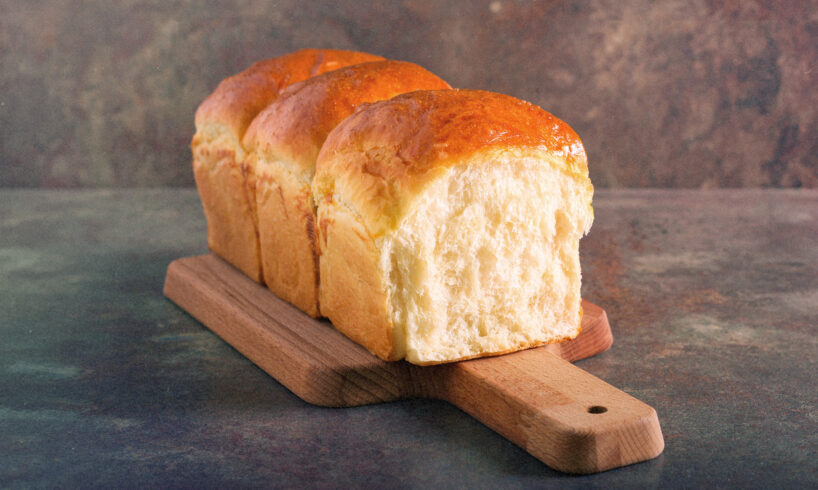
There’s nothing immediately flashy about shokupan, also called Japanese milk bread. At first glance, it may just look like your standard loaf of white bread — but it’s so much more than that. If you’ve tried any fruit sando (dessert sandwiches) from any convenience store, you’ll recognize it as the pillowy soft and subtly sweet bread used in the sandwich.
What started as a Western import is now a fixture of the Japanese breakfast table, and in recent years, it’s evolved into a food obsession, complete with specialty shops, long queues and loaves that cost more than ¥1,000.
Here’s how shokupan rose to prominence in Japan — and where you can find the best in Tokyo today.
The History of Shokupan
Shokupan (literally, “eating bread”) is a soft, fluffy white loaf baked in a rectangular mold — a Japanese adaptation of European breads like the British tin loaf and French pain de mie. Introduced during the Meiji era as Japan began embracing Western food culture, it became more widespread after World War II, when it was served in school lunches during a period of food shortages.
What sets shokupan apart today is its impossibly pillowy texture, milky aroma and delicate sweetness. Made with a precise balance of high-hydration dough, often including ingredients like milk, cream or yudane (a gelatinized flour paste), it’s bread with a tender chew and rich, cloudlike crumb. Whether toasted with butter, used for sandwiches, or eaten plain, shokupan is all about comfort — simple, soft and nostalgic.
Where To Buy Tokyo’s Best Shokupan
Centre The Bakery (Ginza)
This popular Ginza bakery is known as a paradise for shokupan lovers, offering both dine-in and takeout options. It’s known for its morning toast set, which includes just three simple options: plain toast with butter and jam, cheese toast and French toast. You can also choose between three types of bread: North American Pullman, the English plain loaf and Japanese shokupan. After breakfast hours, the menu expands to include hearty options like egg and cheese toast, shrimp toast and more. There’s also a smaller Aoyama branch that offers takeout shokupan only.
Official website (Instagram only)
Pelican (Asakusa)
Pelican has been baking its signature sliced bread in Asakusa since 1932, just steps from Kappabashi Street. Loyal fans begin lining up before the shop opens at 8 a.m., and loaves often sell out by lunchtime. The shop also runs a small cafe serving breakfast and lunch options like ham and cheese toast, katsu (breaded pork cutlet) sandwiches, fruit sando and charcoal-grilled toast with butter and jam. A second location recently opened in Azabudai Hills.
Official website
Nogami (Multiple locations)
Selected as one of Japan’s Top 10 loaves in 2016, high-end bread chain Nogami reportedly sells over 20,000 loaves a day. Known for its “nama (raw) shokupan,” Nogami bakes each loaf in-store using a custom-blended flour mix. There’s no dine-in, but you can pick up a jam set with strawberry, marmalade or blueberry to pair with your loaf. In Tokyo, you’ll find locations in Azabu-Juban, Meguro, Nakano, Tanashi and Ayase.
Official website
Oreno Bakery (Ebisu)
Stylized as “俺のBakery” (“My Bakery”), this upscale shop is located inside Yebisu Garden Place and is known for its premium loaves made with rare Hokkaido wheat and milk sourced from free-range cows at Nakahora Farm in Iwate Prefecture. Each loaf is branded with kanji characters “fragrance,” emphasizing its sweet and subtle aroma.
Beyond its signature shokupan, Oreno Bakery also offers a wide variety of baked goods, including pastries, baguettes and hearty sandwiches. The adjacent terrace — shared with Oreno Italian Beer Terrace — offers fresh bread alongside pizzas and beer in an open-air setting.
Official website
Komeichi (Akabanebashi)
A must-visit for the gluten-free crowd, Komeichi stands out for its innovative use of rice flour instead of wheat. This takeout-only bakery specializes in rice flour shokupan, available in two types: a classic rice base and a unique umami-rich loaf made with a light dashi broth.
The shop also offers a creative menu of open sandwiches with savory toppings like onion, mushrooms and tomatoes, along with sweet pies and French toast. Loaves can be bought whole, and the moist, springy texture of the rice-based bread makes it a satisfying alternative to traditional shokupan.
Official website





